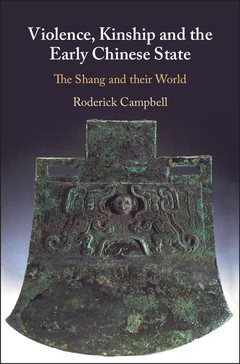Description
Violence, Kinship and the Early Chinese State
The Shang and their World
Author: Campbell Roderick
The violence of war and sacrifice were not the antithesis of civilization at Shang Anyang, but rather its foundation.
Language: English
Publication date: 05-2018
358 p. · 15.8x23.5 cm · Hardback
358 p. · 15.8x23.5 cm · Hardback
Description
/li>Contents
/li>Biography
/li>
Situated between myth and history, the Shang has been hailed both as China's first historical dynasty and as one of the world's primary civilizations. This book is an up-to-date synthesis of the archaeological, palaeographic and transmitted textual evidence for the Shang polity at Anyang (c.1250?1050 BCE). Roderick Campbell argues that violence was not the antithesis of civilization at Shang Anyang, but rather its foundation in war and sacrifice. He explores the social economy of practices and beliefs that produced the ancestral order of the Shang polity. From the authority of posthumously deified kings, to the animalization of human sacrificial victims, the ancestral ritual complex structured the Shang world through its key institutions of war, sacrifice, and burial. Mediated by hierarchical lineages, participation in these practices was basic to being Shang. This volume, which is based on the most up-to-date evidence, offers comprehensive and cutting-edge insight into the Chinese Bronze Age civilization.
1. Being, society and world: towards an inter-ontic approach; 2. Cities, states and civilizations; 3. Central plains civilization from Erlitou to Anyang; 4. The great settlement Shang and its polity: networks, boundaries and the social economy; 5. Kinship, place and social order; 6. Violence and Shang civilization; 7. Constructing the ancestors: the social economy of burial; 8. Technologies of pacification and the world of the great settlement Shang.
Roderick Campbell is Associate Professor of East Asian Archaeology and History at the Institute for the Study of the Ancient World, New York University. He has received numerous fellowships, awards, and grants for his work from institutions such as the Luce Archaeology Initiative, the Chiang Ching-kuo Foundation, and the Canadian Social Sciences and Humanities Research Council.
© 2024 LAVOISIER S.A.S.
These books may interest you

Reading of Shāng Inscriptions 105.49 €



